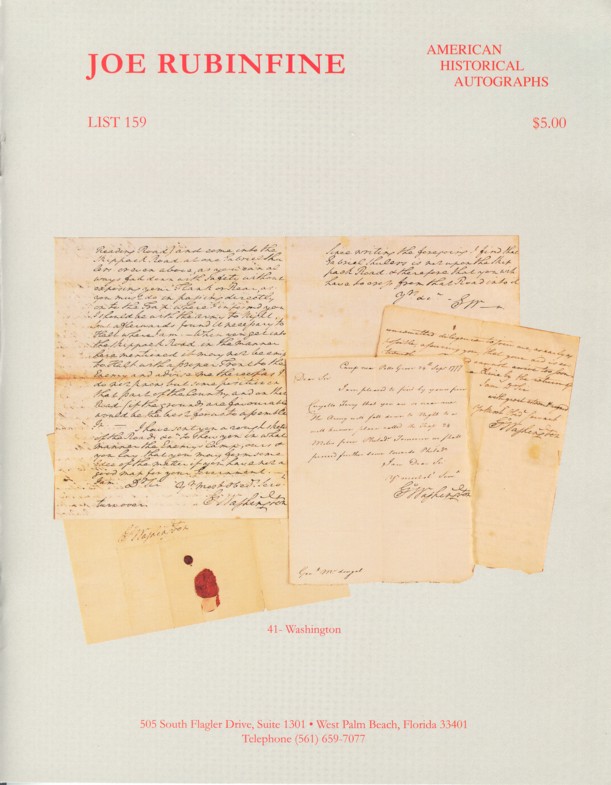American Autographs from Joe Rubinfine

American Autographs from Joe Rubinfine
By Michael Stillman
Joe Rubinfine American Historical Autographs offers a new group of autographed documents from important American historical figures. Included are several of the most collectible of signatures in the land -- George Washington, Abraham Lincoln, Thomas Jefferson and Franklin Delano Roosevelt. Most noteworthy is that some of these documents are not only very significant, but were previously unknown. Rubinfine evidently has some sources that have been underground for over two centuries. Here you will find America's history in the making, often in descriptions written by those who played a major role. Here are a few to be found in his List 159.
Item 24 is an example of a previously unknown and remarkable letter. It was written by Colonel Henry Knox, from near the banks of the Delaware River, December 24, 1776. It was Knox who directed troops the following night during Washington's famous crossing of the Delaware, a masterful job that enabled Washington and his forces to secure a major victory at Trenton. Knox was immediately promoted to General for his success, and would later serve Washington as America's first Secretary of War. As an aside, prior to his hooking up with the revolutionary forces and assuming a major leadership position at the age of 26, Knox had been a bookseller in Boston. Knox writes his wife, Lucy, for whom he expresses great love and sorrow over their separation, on the eve of the great crossing. He leaves little doubt that this is a calling he must answer. He notes it is his duty "to put a stop to the barbarities & wanton cruelty which would disgrace the most unprincipled Savages on Earth..." He has a few other choice words for the English -- "...I did not conceive it to be in the breasts of any people on earth much less the boasted humane breasts of Englishmen to ravish daughters and wives & oblig'd their unhappy parents and husbands to be witness of their infernal brutalities." Knox expresses the view that America has been passive in responding to British efforts to subjugate its people, but states, "...I have not the Shadow of a doubt that America...will rise Superior to all temporary depressions." Of course, Knox would have known quite well of the rising his troops planned for the following evening. Priced at $75,000.
It would take several years for the war to turn America's way, and even after their victory at Yorktown sealed Britain's fate, life would not be easy for America's soldiers. In 1782, General Benjamin Lincoln, as Secretary of War for the Continental Congress, wrote to fellow General Nathanael Greene. His troops were desperately short on clothing and supplies, and Greene was trying to get some relief. A sympathetic Lincoln responds, "...the sufferings of your troops have impressed me with the deepest concern -- and the very painful sensations, which your relation of them excites, are poignantly enhanced by the reflection that these distresses should have been the lot of an army, not only entitled by special contract to better fare -- but whose meritorious and gallant exertions, under the most extreme difficulties, merited a very different fate." Alas, poor Lincoln must relate that he is helpless to respond. "Mine is the unhappy station in which I must hear these complaints without having it in my power to redress the grievances." Item 28. $3,500.